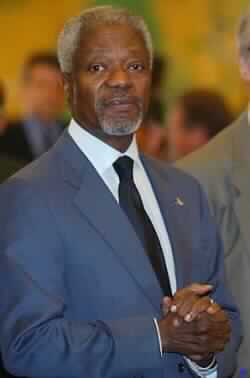HIGHLIGHTS: Contacts Between the Two Sides Will Be Limited to Technical Matters for the Time Being ||Annan Says Not in a Position to Answer Iraq's Political Questions||Fears Iraq is Trying to Drag Diplomatic Maneuvering Offering Progress on Some Issues, But Not Moving on Inspectors' Question|| STORY: United Nations Secretary-General Kofi Annan deliberately avoided setting a date for a new round of meetings with Iraq until Baghdad showed some willingness to resume arms inspections, diplomats said on Saturday. (Read photo caption)
After two days of crucial talks with an Iraqi delegation led by Foreign Minister Naji Sabri, neither side attempted to hide the failure to agree on the return of U.N. weapons inspectors, out of Baghdad for more than three years.
"We have agreed to maintain contacts, including continuing discussions on technical matters," Annan said after the talks ended on Friday, the third high-level session this year.
But by reducing future sessions to "technical issues," Annan left open his own participation unless Iraq showed signs of allowing inspectors to scrutinize any remaining weapons of mass destruction, according to sources close to the talks.
"He drew the line after three meetings but he didn't pull the plug on the process," said one senior envoy.
In the meantime, Annan said the Iraqi delegation "would report to their authorities." Among the group were two arms advisers to President Saddam Hussein, who have ministerial rank in his inner council.
The inspectors left Iraq in December 1998, the eve of a U.S.-British bombing campaign to punish Baghdad for not cooperating with the arms experts. Accounting for Iraq's dangerous weapons is key to suspending U.N. sanctions, imposed when Iraq invaded Kuwait in August 1990.
Iraq has been seeking assurances from Annan since May that the United States would not carry out its threats to topple Saddam. But Annan repeatedly said he was not in a position to reply to such questions.
NOT IN A POSITION TO ANSWER POLITICAL QUESTIONS
After calling the talks "constructive," Annan expressed his disappointment more clearly than he had after talks with Sabri in March and May. "I would have preferred more," he said. "I cannot force a decision."
Tellingly, the secretary-general did not appear on the same podium with Sabri, who lashed out at the United States for forcing a continuance of the 12-year old U.N. sanctions.
In Washington, the State Department said the administration of President Bush was not surprised the talks failed, adding that Iraqi statements before the talks foreshadowed the outcome.
Participants in the meetings said a New York Times article outlining the Bush administration's attack plans against Iraq by land, sea and air did not help the discussions.
Some United Nations officials worry that Iraq may try to drag out diplomatic maneuvering with Annan, offering progress on some issues, but not moving on the inspectors until an American attack appears imminent.
At the Vienna talks, Baghdad, for example, completed arrangements to turn over six truckloads of state papers looted from Kuwaiti archives during its occupation of the emirate.
PHOTO CAPTION
U.N. Secretary General Kofi Annan addresses a news conference in Vienna July 5, 2002. Annan deliberately avoided setting a date for a new round of meetings with Iraq until Baghdad showed some willingness to resume arms inspections, diplomats said on July 6. (Leonhard Foeger/Reuters)
- Author:
& News Agencies - Section:
WORLD HEADLINES


 Home
Home Discover Islam
Discover Islam Quran Recitations
Quran Recitations Lectures
Lectures
 Fatwa
Fatwa Articles
Articles Fiqh
Fiqh E-Books
E-Books Boys & Girls
Boys & Girls  Hajj Rulings
Hajj Rulings Hajj Fatwas
Hajj Fatwas














